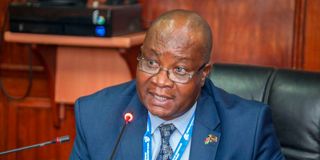Premium
KICD in race against time to scrap competency-based curriculum subjects

Kenya Institute of Curriculum Development CEO Charles Ong’ondo before a parliamentary committee at Parliament buildings in Nairobi on June 7, 2023.
It is a race against time for the Kenya Institute of Curriculum Development (KICD) to implement the education reforms task force’s recommendation to reduce the number of subjects in pre-primary, primary and junior secondary school (JSS).
Currently, learners in Grade 7 are taking 12 core subjects and a maximum of two optional subjects. However, the Presidential Working Party on Education Reforms (PWPER) proposed that this number be reduced to eight.
The 12 core subjects are English, mathematics, pre-technical studies, Kiswahili/Kenya Sign Language, integrated science, social studies, business studies, agriculture and religious education (Islam, Hindu or Christian). Other subjects include health education, sports and physical education and life skills.
KICD Chief Executive Officer Charles Ong’ondo said the agency has until the end of August to rationalise subjects from pre-primary to JSS.
“The question was, do we continue with the competency-based curriculum (CBC) or not? What about things like parental engagement? Parents feel overburdened ... it was about the very many learning areas,” Prof Ong’ondo said.
“About 90 per cent of Kenyans told the task force that CBC should continue, but we can address the few gaps that exist. One of them is the need to rationalise some of the learning areas. The word is not reduce but rationalise some learning areas and they gave us the specific numbers. That guidance on numbers is very important,” he said.
Prof Ong’ondo assured Kenyans that it is was feasible to rationalise the learning areas and that KICD had started deliberating on the learning areas to be affected.
“We are looking at learning areas that have similar strands and sub strands that we can put together and rationalise the time spent on learning them so that learners still get those skills and competencies but without making it look like there are too many learning areas,” he explained.
In pre-primary, there are currently five learning areas which will remain the same. In lower primary there are about nine learning areas, which will be reduced to seven. In upper primary there are 10 learning areas, which will be reduced to eight. At JSS, subjects will be reduced from 14 to nine.
“What we are going to do now is to ensure that learners (in JSS) have eight core learning areas and only one elective. We are already working on this and we believe that by September, we should be able to provide guidance on the way forward through the Ministry of Education,” Prof Ong’ondo said.
The eight subjects that will remain core in JSS are English, mathematics, Kiswahili, integrated science, social studies, religious education (Islam, Hindu or Christian), pre-technical studies and agriculture. The ninth subject will be a choice between arts (visual and performing arts), applied sciences (home economics, computer studies or business studies) and foreign languages.
“I want to assure the country that we are not losing anything, I liked the word used by the presidential working group, we are rationalising to make sure that we are still holding the tents of the CBC but at the same time making sure that the fear of burdening parents is addressed,” said Prof Ong’ondo.
Education stakeholders, including and the National Parents Association, have welcomed the review of learning areas, saying the move will ease the burden on learners.
“It’s a win-win situation for everyone, the child has less commitment and different tasks, and the schools also have adequate teachers for these subjects,” said Kenya Private Schools Association chairman Charles Ochome.
The National Parents Association chairman, Mr Silas Obuhatsa, said parents will be at peace once the recommendations are implemented.





